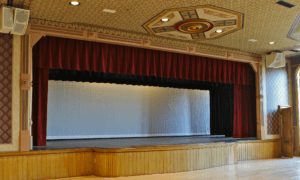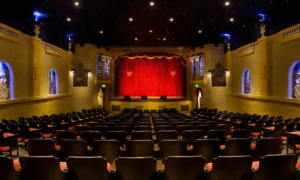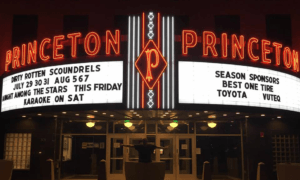Chelsea Schneider, Municipal Innovations Specialist
The restorations of historic theaters are breathing new life into the downtowns of cities and towns across the state.
Here are four must-see projects.

A restored James Whitcomb Riley retreat in Delphi
The building now home to the restored Delphi Opera House originally opened in 1865. Though the third floor of the building was named city hall, the space was used for entertainment instead of government meetings. For its first event, the venue played host to a ball welcoming home soldiers from the Civil War. Nearly 30 years later, it was converted into an opera house until it was shuttered in 1914 following the advent of the movie industry and safety concerns after a fire destroyed the Dryfus Theater in Lafayette.
During its heyday, most towns with train depots featured an opera house, and Delphi had two to three venues under different names, said Anita Werling, president of Delphi Opera House, Inc. Hoosier poet James Whitcomb Riley was closely associated with the Opera House having performed at the venue several times during his visits to Delphi. His poem “On the Banks O’ Deer Crick” is set in the city.
Following its closure, the upper floor once containing the Opera House became storage space for retail shops on the lower floors. By 2007, a group of preservationists had purchased the entire building, and Delphi’s recognition as a Stellar Community in 2012 accelerated restoration efforts. The Opera House was a centerpiece of Delphi’s application to Stellar, a program which infuses state funding into designated communities, Werling said.
At the time, the city was in a make-or-break situation, Werling said. A planned highway project threatened to move traffic further away from downtown.
“Was it going to sound the death knell,” Werling asked. “Or would it be the clarion call to really revitalize the downtown?”
The latter occurred.

Spencer project fosters downtown revitalization
Since the Tivoli Theatre in Spencer re-opened in 2013, the downtown has seen a revitalization.
“There are all kinds of improvements happening there on the square,” said Rob White, board president of Owen County Preservations. New businesses are opening, and existing businesses are relocating to the town’s center.
The theater, which opened on New Year’s Eve in 1928, has come a long way since its closure in 1999. The local preservations group purchased the building, and Cook Group, Inc., offered financial support to make the restoration a reality.
In the 1920s, a local artist had built the theater as a Spanish garden with clay tile. Back then, a Greyhound bus went through Downtown Spencer and movies cost 10 cents. Today, the original ticket booth is still in use and a local winery rents an accompanying retail space as a tasting room. The project also features a fiber optics installation to make the theater’s ceiling look like the night sky. And it’s down to the detail – the stars are arranged to reflect how the sky looked at 9 p.m. Dec. 31, 1928.
Visitors tell White the restored theater is just how they remember it from their childhood.
“People have seen that jewel right there so close to the square, and it’s made other people want to restore things,” White said. “The town is busy. We have a lot of highway traffic. Sometimes passers-by don’t see what we have in town. Once you get off the highway, you start to see the charm.”

Fowler restores its community gem
In 1940, Fowler became home to the state-of-the-art Fowler Theatre. But 60 years later, the theater’s then-owner planned to demolish the historic art-deco building. After hearing the plans, the Prairie Preservation Guild quickly formed to purchase the Fowler and restore the theater to its former grandeur.
“It’s described as the gem of the community,” said Jill Byrd, executive director of the Fowler Theatre. “It’s the only form of entertainment in the town.”
Since 2001, the group has obtained grants to revamp the theater’s marquee, ticket booth and roof. The interior of the theater also was restored including the lobby, concession area and auditorium. Fundraisers were held where community members could purchase a bulb to light the marquee or a chair featuring a plaque with their name.
The group also met another important goal: maintaining affordable prices. Adult tickets are $6 and children’s tickets are $4.
“Pretty much everyone in the community is able to afford to come,” Byrd said. “Everybody loves it. They didn’t want it to go away. It’s something for them to do and everyone has a story when they come in.”
This year, the daughter of the theater’s builder came to Fowler for a visit. She was in awe of the work.
“She absolutely approved with what we did,” Byrd said.

Historic Princeton Theatre becomes versatile space
When the Princeton Theatre opened in 1946, it was the only movie theater around.
“People would come from all around because it was the most advanced, and it stayed that way for quite a while,” said Logan Vickers, facilities manager and coordinator of The Princeton Theatre and Community Center. “I saw my first movie there. So many people have so many memories with it.”
But by the time the theater closed down in 2011, it had fallen into disrepair, Vickers said. Princeton becoming a Stellar Community with the state provided the funding to make the restoration a reality. The addition of the theater project to the Stellar bid was integral in the city earning the designation, Vickers said.
“The community has really been behind it from the start,” Vickers said.
The renovation focused on the building’s sustainability. What resulted is a versatile space. The theater company does four shows a year, and a screen can lower for movie series. The facility also serves as a community center for weddings, business meetings and class reunions.
“It really has taken a piece of history with the city that had fallen into disrepair and brought it back to life,” Vickers said. “In a way that has allowed a lot of people to come together and participate in something as a community. They are able to come be entertained and see things that we are really proud to put on. It’s been really special.”
